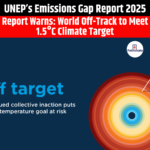Iran-Israel Conflict
|
General Studies Paper II: Groups and Agreements Involving and/or Affecting India’s Interests |
Why in News?
Israel recently initiated ‘Operation Rising Lion’, targeting Iran’s nuclear infrastructure and military positions. In response, Iran launched several ballistic missiles toward Israeli targets.
What is the Iran-Israel Conflict?
- The Iran-Israel conflict is a proxy war, in which both nations mainly do not usually engage in direct warfare, but instead challenge each other through their respective allies and organizations.
- Iran supports Shia militant organizations, while Israel conducts military operations against them.
- Iran identifies itself as a supporter of Palestine and considers it an oppressed community. Iran supports militant groups like Hamas and Hezbollah through funding and arms.
- Israel considers these organizations as terrorist groups and follows a policy aimed at eliminating them.
- Israel sees Iran’s growing regional influence as a potential existential threat. This is why Israel has sought strict sanctions against Iran from the United States and the United Nations.
Historical Background of the Iran-Israel Conflict
- Early Relations: There was a time when Iran and Israel shared cooperative relations. During the 1950s and 60s, Iran was among the few West Asian nations to recognize Israel. Under Shah Mohammad Reza Pahlavi, the two countries shared trade ties and intelligence. However, this equation completely changed after the 1979 Islamic Revolution in Iran.
- 1979 Iranian Revolution: This revolution transformed Iran into a religion-based nation. The new government declared America and Israel as enemies of Islam. Labeling Israel as a Zionist and imperialist power, Iran severed all diplomatic ties.
- Formation of Hezbollah: In the 1980s, Iran established Hezbollah, a Shia organization in Lebanon. This group was positioned at the forefront of anti-Israel resistance. Iran has backed these groups with resources, training, and strategic guidance. Hezbollah adopted a policy in 1985 to completely expel Israel from Lebanon and destroy it. Since then, Israel has viewed Hezbollah as a major threat.
- South Lebanon: In 2000, Israel withdrew its troops from South Lebanon, which it had occupied. Hezbollah then established full control over the area. From then until 2006, there were sporadic clashes, though their impact was limited. During these years, Hezbollah acquired modern weapons, all of which were attributed to Iran.
- 2006 War: In July 2006, a war erupted between Israel and Hezbollah. Iranian Revolutionary Guards played a direct role in this conflict. They assisted in missile operations and helped deploy modern weapons. Israel took this war as a major warning and further hardened its stance against Iran.
- Syria: To weaken Iranian foothold in Syria, Israel has launched several air raids. In 2007, Israel destroyed a Syrian nuclear facility, allegedly killing North Korean scientists involved in its development.
Main Causes Behind the Iran-Israel Conflict
- Ideological Differences: Iran is a Shia Islamic Republic, while Israel is recognized as a Jewish state. The religious ideologies of both countries are fundamentally different. In Iran, Shia Islam holds supreme authority in its political structure, while Israel’s governance is shaped around Jewish religious principles. Over time, this difference has transformed into distrust and bitterness.
- Opposing Stance on the Palestinian Issue: Iran has long supported Palestinian rights. Its policy states that until Palestinians get an independent nation, they will continue to receive its backing. This ongoing strategy keeps military and political tensions high.
- Race for Regional Dominance: In the Middle East, both Iran and Israel aim to play influential roles. This regional rivalry has brought them face-to-face in various conflicts. For instance, in Syria and Yemen, Iran supports the Assad regime and Houthi rebels, while Israel considers these actions a direct threat.
- Iran seeks to challenge Saudi Arabian and American influence, whereas Israel collaborates with the US and Gulf countries to restrain Iran.
- Nuclear Program Dispute: Israel considers Iran’s nuclear ambitions to be a serious national security risk. It fears that Iran may develop nuclear weapons, which could jeopardize Israel’s very existence. As a result, Israel has launched covert operations multiple times to obstruct Iran’s nuclear activities.
- Covert Operations: Both countries have engaged in covert missions and cyberattacks against one another. Israel has assassinated Iranian nuclear scientists and used cyber weapons to disrupt programs. On the other hand, Iran has attempted attacks on Israel via its proxy groups. These activities further fuel mutual distrust and hostility.
Major Events in the Iran-Israel Conflict
- In 2010, a highly advanced computer virus called “Stuxnet” was revealed. The U.S. and Israel jointly developed a cyberweapon to disrupt Iran’s nuclear progress.
- Its purpose was to damage Iran’s Natanz nuclear facility. Nearly 1,000 centrifuges were destroyed as a result.
- Between 2013 and 2017, Israel repeatedly launched airstrikes on Iranian and Hezbollah positions in Syrian territory.
- In January 2013, the first strike was carried out on a Syrian convoy, allegedly carrying Iranian weapons.
- Hezbollah’s 2015 assault on Shebaa Farms was viewed by Israel as a provocation.
- In 2017, for the first time, Syria fired missiles at Israeli aircraft.
- Mossad seized critical nuclear documents from Tehran in a covert 2018 operation.
- These included around 50,000 papers and 163 disks containing sensitive information related to Iran’s nuclear program.
- In February 2022, an Iranian drone base was completely destroyed in an Israeli strike. Iran retaliated by targeting the U.S. consulate in Erbil with missile strikes.
- An elite Iranian military officer was assassinated in Tehran in May 2022.
- On October 7, 2023, Hamas launched a surprise offensive from Gaza into Israel.
- Approximately 3,000 rockets were fired, and around 2,500 fighters infiltrated Israeli borders, targeting both civilians and military installations. Women and children were taken hostage.
- In response, Israel launched a massive military campaign on Gaza and officially declared war.
- Iran expressed its support for Hamas in the attack and issued a warning to Israel.
Global Implications of the Iran-Israel Conflict
- Global Oil Market: Iran is a major oil-producing country, and its geostrategic importance lies in its location near key maritime routes in the Gulf region.
- As soon as Israel launched its military campaign in 2025, there was an approximate 9% rise in oil prices.
- Following the conflict, Brent crude oil prices surged past $78 per barrel globally.
- If the conflict continues, the global energy supply chain could be severely disrupted.
- In case of a disruption in Iran’s oil exports, OPEC has some buffer production capacity, but it’s only a temporary solution.
- If Israel targets Iran’s key oil sites, such as Kharg Island, the entire supply system could face a deep crisis.
- Air Routes Disrupted: Following the closure of Iranian and Israeli airspaces, aircrafts began to avoid Iranian airspace.
- Flight paths between Europe and Asia were disrupted due to regional airspace closures.
- Many planes had to reroute through alternative paths, resulting in increased distance and fuel costs.
- Possibility of a Humanitarian Crisis: As the conflict escalates, civilians face increasing danger. Schools, hospitals, and homes are no longer safe.
- This could lead to the displacement of millions of people.
- In the near future, this will place immense pressure on international relief agencies, and the world may have to deal with a major humanitarian crisis.
- Strategic Setback: After Israel’s attacks, Iran directly blamed the United States, accusing it of being “indirectly involved” in the offensive.
- As a result, the negotiations over the nuclear deal between Iran and the U.S. have completely halted.
- Iran has clearly stated that any dialogue with the U.S. is now ‘meaningless’.









